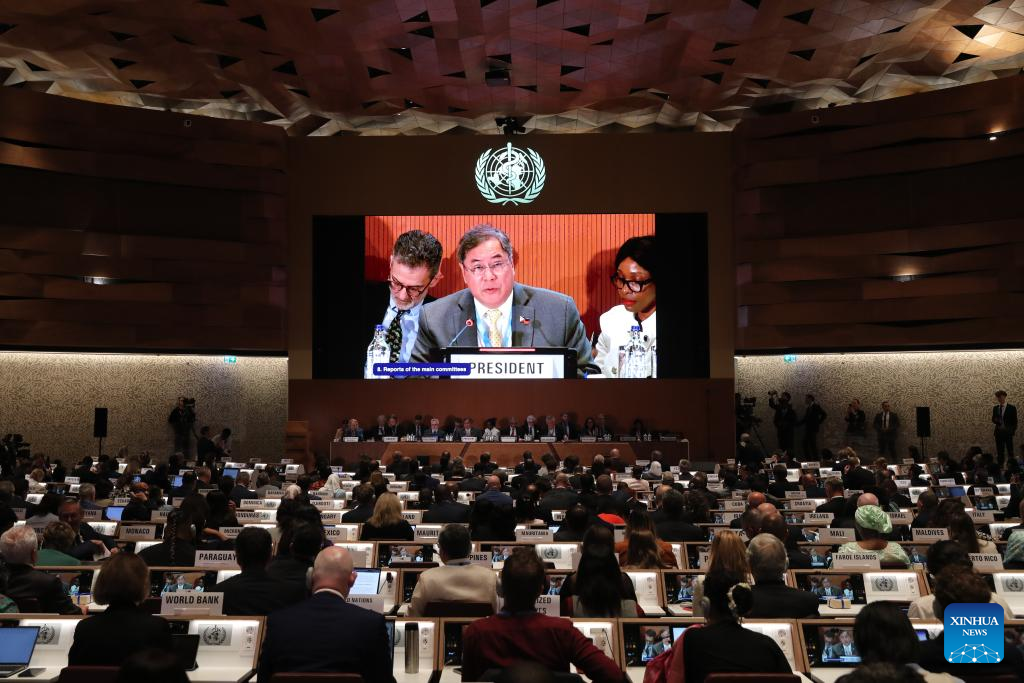Historic pandemic agreement highlights multilateral cooperation pushed by China among others

The adoption, on May 20, of the World Health Organization Pandemic Agreement, after three years of intensive negotiation among member states, has showcased China’s active participation in the negotiations and the trends of multilateralism, unity, and cooperation among nations.
WHO Director-General Tedros Adhanom Ghebreyesus told the plenary session of the 78th World Health Assembly in Geneva, Switzerland, on May 20 that the pact “will rank among the most significant achievements in the history of this organization, and of global health”.
“Today, you have sent a loud message that multilateralism not only works, but is the only way to find shared solutions to shared threats,” he said.
Described as a “watershed” agreement and the first of its kind, the treaty was designed to address gaps and inequities in preventing, preparing for, and responding to pandemics, the WHO said in a news release.
The treaty is only the second international legal agreement negotiated and agreed in the history of the WHO, the first being the WHO Framework Convention on Tobacco Control, the organization said.
Key elements include the rapid sharing of data about new diseases, the distribution of medical resources to the WHO in the event of a future outbreak, and the transfer of health technologies to poorer nations.
The World Health Assembly is the WHO’s highest decision-making body. The 78th assembly runs until May 27 and is themed “One World for Health”.
Teodoro Herbosa, secretary of the Philippines Department of Health, and president of this year’s World Health Assembly, said: “Now that the agreement has been brought to life, we must all act with the same urgency to implement its critical elements, including systems to ensure equitable access to lifesaving pandemic-related health products.”
Hu Guang, who is in charge of health emergency response at China’s National Disease Control and Prevention Administration, and who was deeply involved in the drafting and negotiations of the agreement, told China Daily on May 20: “Guided by the vision of building a global community of health for all proposed by Chinese President Xi Jinping, China has practiced true multilateralism and has advocated for strengthening solidarity and cooperation among nations during the talks.”
On issues such as pandemic prevention and surveillance, China has maintained a scientific approach, put forward reasonable amendments to the text, and played an active role in drafting relevant provisions, he said.
He noted that, thanks to China’s efforts, parties agreed to focus the scope of surveillance on newly emerging and reemerging infectious diseases with pandemic potential, as well as clarify the scope of institutions for information sharing.
“In addition, together with Brazil, Indonesia, Bangladesh, and other countries, within the framework of ‘Friends of Fairness’, China actively responds to the reasonable demands of developing countries for fair access to health products, demonstrating its role as a responsible major country,” he added.
Before the treaty can be opened for signature, considered for ratification — including by national legislative bodies — and finally enter into force, there are still issues that remain unsolved, notably the annex’s pathogen access and benefit-sharing system.
The system will address how countries — especially underdeveloped ones — could benefit from sharing pathogens with pandemic potential, particularly in exchange for pharmaceutical products if developed by drugmakers. Results of the negotiation will be considered at next year’s assembly.
China will continue to firmly support the World Health Organization and multilateralism, and stands ready to jointly build a global community of health with all WHO member states, said Lei Haichao, minister of China’s National Health Commission, at the assembly on May 19.
Lei, who is also head of the Chinese delegation to the 78th assembly, said China consistently and firmly supports the WHO in playing its leading role in coordinating global public health affairs, while actively engaging in international health cooperation.
“Over the past six decades, China has dispatched more than 30,000 medical personnel to 77 countries and regions, providing treatment to over 300 million patients,” he said. “During the COVID-19 pandemic, China supplied 500 billion personal protective items and 2.3 billion doses of vaccines globally.”
Lei also highlighted the progress China has made in promoting the health and well-being of its people, particularly improving key health indicators of residents and equitable access to health services.
“In 2024, China’s average life expectancy reached 79 years,” he said. “Primary healthcare institutions have been established in both rural areas and urban communities, with 90.8 percent of families able to reach the nearest medical facility within 15 minutes.”
Contact the writer at zhengwanyin@mail.chinadailyuk.com


